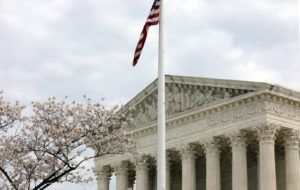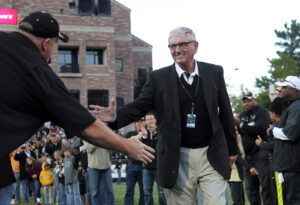
WASHINGTON (BP)–Wisconsin became the first state in the union Nov. 3 to elect an openly lesbian candidate to the United States House of Representatives, bringing the number of known homosexual representatives in the 435-member House to three.
Tammy Baldwin, a state representative from Wisconsin, becomes the first openly homosexual non-incumbent elected to Congress. The 36-year-old Democrat, the first woman elected to Congress from Wisconsin, garnered 53 percent of the vote in her race against former state insurance commissioner Republican Josephine Musser, who received 47 percent. Retiring GOP Rep. Scott Klug did not seek re-election.
Baldwin will join two other homosexual congressional incumbents re-elected Nov. 3: Democratic Rep. Barney Frank of Massachusetts, who was unopposed for a 10th term, and GOP Rep. James Kolbe, who was re-elected in Arizona for an eighth term over Democratic challenger Tom Volgy. Kolbe received 52 percent of the vote to Volgy’s 45 percent. A candidate from the Libertarian party received 2 percent.
While homosexual activists touted Baldwin’s election and re-election of two homosexual incumbents as major steps toward normalizing homosexuality in America, conservative Christian organizations claimed moral victories as well, citing the approval of anti-homosexual marriage measures in Alaska and Hawaii by two-to-one margins and the defeat of a homosexual-rights ordinance in Colorado.
Celebration by gay activists of Baldwin’s victory was tempered by defeats of three homosexual Democratic candidates for Congress in Oklahoma, Washington and California who were attempting to unseat Republican incumbents.
In Oklahoma, Republican Rep. Frank Lucas defeated Democratic challenger Paul Barby 65-33 percent. An independent candidate received 2 percent.
Incumbent Republican Jack Metcalf, who represents a Washington district north of Seattle, defeated former Army nurse Grethe Cammermeyer 55-45 percent.
Cammermeyer became a celebrity as she battled the Washington Army National Guard to keep her position despite being a lesbian. Actress Glenn Close portrayed Cammermeyer in a television movie, “Serving in Silence.”
And in California, incumbent Republican Brian Bilbary defeated veteran Democratic San Diego City Councilwoman Christine Kehoe 49-46 percent. Three other candidates spilt the remaining 5 percent of the vote.
Elizabeth Birch, executive director of the Washington-based Human Rights Campaign, described Baldwin’s election as a repudiation of the GOP’s rightward move characterized by anti-homosexual rhetoric and advertising on the campaign trail and by a flurry of ant-homosexual legislation on Capitol Hill.
” She [Baldwin] has broken down a very large door,” Birch told the Associated Press. “She has created an arch of hope that future gay and lesbian candidates will be able to walk through.”
Richard Land, president of the Southern Baptist Convention’s Ethics & Religious Liberty Commission, said it would be premature to interpret Baldwin’s election as a trend. “Obviously, it’s more accepted than it was 10 or 20 years ago, but I don’t think three out of 435 is a trend,” he said.
Robert Knight, director of cultural studies with the Washington-based Family Research Council, said that despite the homosexual movement’s advance in Congress that “when voters have had a chance to vote directly on a moral question they have tended to do the right thing.”
“Given the smashing successes in Hawaii and Alaska, and even in Fort Collins, Colo., at the center of gay-activists’ hate campaign against Christians because of Matt Shepherd’s death there, the voters overwhelmingly backed traditional morality and rejected gay demands.”
Knight said “weak candidates” espousing “mealy mouth rhetoric” on issues of morality failed to inspire conservative Christian voters. “Where Christians were energized, the results were obvious and they became demoralized where candidates declined to take a stand on moral issues,” he said.
Citing California Republican candidate Matt Fong’s defeat to Democratic incumbent Senator Barbara Boxer, Knight said Fong is an example of how candidates hurt themselves by “trying to placate gay activists instead of solidifying their pro-family stance.”
Fong pledged to support a list of gay issues after the Gay Log Cabin Republicans group threatened to pull its endorsement because of Fong’s $50,000 donation to the Traditional Values Coalition.
“Pandering to that tiny group and throwing away the pro-family vote is not a smart thing to do, that’s the message that ought to be heard,” Knight said.
Don Wildmon, president of the Mississippi-based American Family Association, blamed a lack of Christian leadership for America’s desensitization to immorality. “We have not educated our people,” he said. “We have not required of them an understanding of the faith.”
Meanwhile, Wildmon said, gay activists are “putting their money where their mouth is and that’s what Christians should be doing.”
The Human Rights Campaign, self-described as the largest national homosexual political organization, contributed about $1 million to campaigns for homosexual candidates. More than $754,000 went to support Democratic candidates, $95,425 to Republican candidates, $2,500 to an independent, $69, 135 to political parties and $64,600 to other political action committees.
The HRC reports raising another $1.5 million for candidates who support homosexual equality.
The Human Rights Campaign identified its top electoral priorities as the re-elections of five “key” senators: Carol Moseley-Braun, D-Ill,; Barbara Boxer, D-Calif.; Russ Feinghold, D-Wis.; Harry Reid, D-Nev.; and Patty Murray, D-Wash. All but Moseley-Braun held onto their seats.











